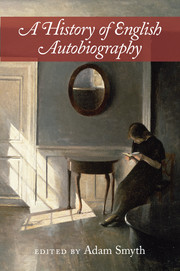Book contents
- Frontmatter
- Dedication
- Contents
- List of contributors
- 1 Introduction: The range, limits, and potentials of the form
- PART 1 AUTOBIOGRAPHY BEFORE ‘AUTOBIOGRAPHY’ (CA. 1300–1700)
- 2 Medieval life-writing: Types, encomia, exemplars, patterns
- 3 Autobiographical selves in the poetry of Chaucer, Gower, Hoccleve, and Lydgate
- 4 The radicalism of early modern spiritual autobiography
- 5 Inscribing the early modern self: The materiality of autobiography
- 6 Re-writing revolution: Life-writing in the Civil Wars
- 7 Money, accounting, and life-writing, 1600–1700: Balancing a life
- PART 2 RELIGION, GENDER, THINGS (CA. 1700–1800)
- PART 3 THE MANY NINETEENTH CENTURIES (CA. 1800–1900)
- PART 4 RELATIONAL LIVES AND FORMS OF REMEMBERING (CA. 1890–1930)
- PART 5 KINDS OF COMMUNITY (CA. 1930-CONTEMPORARY)
- Index
- References
3 - Autobiographical selves in the poetry of Chaucer, Gower, Hoccleve, and Lydgate
from PART 1 - AUTOBIOGRAPHY BEFORE ‘AUTOBIOGRAPHY’ (CA. 1300–1700)
Published online by Cambridge University Press: 05 March 2016
- Frontmatter
- Dedication
- Contents
- List of contributors
- 1 Introduction: The range, limits, and potentials of the form
- PART 1 AUTOBIOGRAPHY BEFORE ‘AUTOBIOGRAPHY’ (CA. 1300–1700)
- 2 Medieval life-writing: Types, encomia, exemplars, patterns
- 3 Autobiographical selves in the poetry of Chaucer, Gower, Hoccleve, and Lydgate
- 4 The radicalism of early modern spiritual autobiography
- 5 Inscribing the early modern self: The materiality of autobiography
- 6 Re-writing revolution: Life-writing in the Civil Wars
- 7 Money, accounting, and life-writing, 1600–1700: Balancing a life
- PART 2 RELIGION, GENDER, THINGS (CA. 1700–1800)
- PART 3 THE MANY NINETEENTH CENTURIES (CA. 1800–1900)
- PART 4 RELATIONAL LIVES AND FORMS OF REMEMBERING (CA. 1890–1930)
- PART 5 KINDS OF COMMUNITY (CA. 1930-CONTEMPORARY)
- Index
- References
Summary
Medieval culture was profoundly influenced by two great spiritual autobiographies inherited from late antiquity: Augustine's Confessions and Boethius's Consolation of Philosophy. Late in the Middle Ages, their influence was undimmed: Geoffrey Chaucer translated Boethius into Middle English in the fourteenth century, for example, and Augustine remained very broadly influential. For many scholars today, the Confessions is the origin of Western life-writing (see DiBattista and Wittman 2014, 5–6).
Yet under this influence, the medieval period itself did not produce many autobiographies as they are conventionally defined. Peter Abelard's Historia Calamitatum is generally thought to be one; Guibert of Nogent's Monodiae or Memoirs another (Fleming 2014). The Book of Margery Kempe is also often said to be the first English autobiography, but this is a complicated case, not least because Margery did not write the book herself (for more, see the preceding chapter). Kempe's book is known from a single manuscript, while Guibert of Nogent's work did not survive in any manuscript. In all, the evidence is that there was little demand for or even interest in what we call ‘autobiography’ in the Middle Ages. Hence, while a recent account of autobiography like Linda Anderson's might begin with Augustine, it then leaps over the Middle Ages entirely to John Bunyan (Anderson 2011).
Nevertheless, several late-medieval English literary writers appear to present us with autobiographical fragments or moments and what appear to be performances of self in their work. Such poems as the Divine Comedy and the Canterbury Tales, as John V. Fleming puts it, ‘are narrated by “characters” who are at once the poet and the poet's invention’ (Fleming 2014, 43). We know from contemporary records that Geoffrey Chaucer worked for several years as a controller of customs in the City of London, so when we see the dreamer of the House of Fame named as ‘Geffrey’ and described as spending his days on ‘rekenynges’ before coming home to sit in front of ‘another book’ (that is, something other than accounts) until he is dazed with his reading, it might appear that we have a fragment of the Chaucerian real life. On the other hand, this particular moment occurs in a dream and in the words of an eagle who is flying Chaucer to Fame's palace: a textual situation which frames the supposed ‘autobiographical’ moment and arguably compromises its claims to truth.
- Type
- Chapter
- Information
- A History of English Autobiography , pp. 27 - 40Publisher: Cambridge University PressPrint publication year: 2016



